I wanted to put together a post with the best horse joint supplement reviews. I hope that this will help you to be able to buy your supplements in a more informed way.
I’ve done my best to split up the supplements that I think are helpful based on the activity level of your horse and their level of joint.
All my recommendations are based on in-depth research I’ve done for myself through scientific articles published in peer reviewed journals. You can learn more about my research here: How To Choose The Best Horse Joint Supplement
You can skip to the section that’s relevant to you using the Table of Contents below!
Usually, people go through trial and error buying supplements. It can take a long time to actually find something effective, and it costs an arm and a leg.
Maybe you’ve already gone through some of this process? Then you know that it’s super annoying.
So I figured I would recommend and review some of the ones I like best on the market based on your specific horse needs.
I don’t just go through every possible type of compound and give you a brand to buy because let’s be honest – you don’t need most of what’s out there. There’s plenty of sites that can do that for you if you like. Instead, I’ve tried to breakdown your specific situation and present you with several options that I think would be best for you and why.
Supplement companies can be super annoying
First, let me say that the thing that annoys me the MOST about these supplements is that some of them 1) don’t even tell you what’s in them and 2) don’t have any actual research backing up the claims that they’re making. This makes it difficult to trust what they’re saying.
Like sure, a product may have a bunch of testimonials, but you can pay people to give you testimonials. It’s not ethical and it’s not pretty but people do it! So I prefer concrete research.
But sometimes these companies have the good products…
The only problem with choosing only supplements with concrete research is that sometimes the ones that won’t display any of their information are, in fact, better. And obviously you want the best for your horse.
Plus, some companies aren’t actually sketchy or anything, they just don’t like publishing their results. They do this so they can keep charging a premium for a formulation that others could imitate and sell for less.
So what do you do? Well there isn’t any perfect answer. But I’ve tried to break everything down for you below.
First thing’s first – get familiar with your horse
In order to do buy the best supplements for your horse you need to be familiar with their health needs. So try to get the following information:
- What supplements is your horse already consuming through their diet? Either through their daily diet, grazing, treats, vet treatments or other supplements that they are already taking.
- Categorize your horse’s current activity level as either: mild, moderate or high. In other words, how much stress is being being put on your horse’s joints?
- Categorize your horse’s future activity level as either: mild, moderate or high. So how much stress is going to be put on your horse’s joints in the foreseeable future?
The numbers don’t need to be perfect
Now don’t stress too much about getting all the numbers perfect. You just want an approximation. If you’ve read things about how awful it is to overdose your horse on nutraceuticals, none of it is based on any actual science.
I’ve heard of horses getting into their tubs of supplements and eating 30 days worth of pills by accident. And guess what? Nothing happened! Extras tend to just pass right through the digestive system and get pooped out. So relax!
Only worry about the minerals
The only thing I would be at all concerned about are minerals – like the manganese, copper and zinc. However, these aren’t contained in most of the supplements below and should only be given if you are sure your horse is deficient. Otherwise, the effects are redundant – the research supporting additional consumption is sparse.
Once you’ve got an idea of the numbers, keep them in mind so you can reject a supplement, for example, if you know it has much more of something than your horse needs. So if I recommend it below and you know your it will double or triple the daily dose of something your horse should be getting, then ignore it and opt for an alternative. Things like that will just be redundant for your horse, cost you extra and most likely won’t add any effect.
Remember these key points:
- Glucosamine and chondroitin work significantly better when given together rather than separately. The effect when they are together is greater than the additive effect of each of them given alone.
- Collagen II, PSGAGs and glucosamine are the only supplements that have been shown to promote regeneration rather than simply prevent further damage. Also note that Collagen II is by far the best but is extremely hard to find. PSGAGs are even harder to find, but not as good.
- ASUs are great for long term preventative care so start your horse on these early if you are planning on doing a lot of strenuous activity with them.
We browse the internet looking for the best of the best of everything horse-related so we can share these things with you. When you buy through links on our site, we may earn an affiliate commission.
The best horse joint supplement reviews…
In the following sections, I try and sort the supplements I would use based on the horse’s activity level and overall joint health:
For lightly worked horses
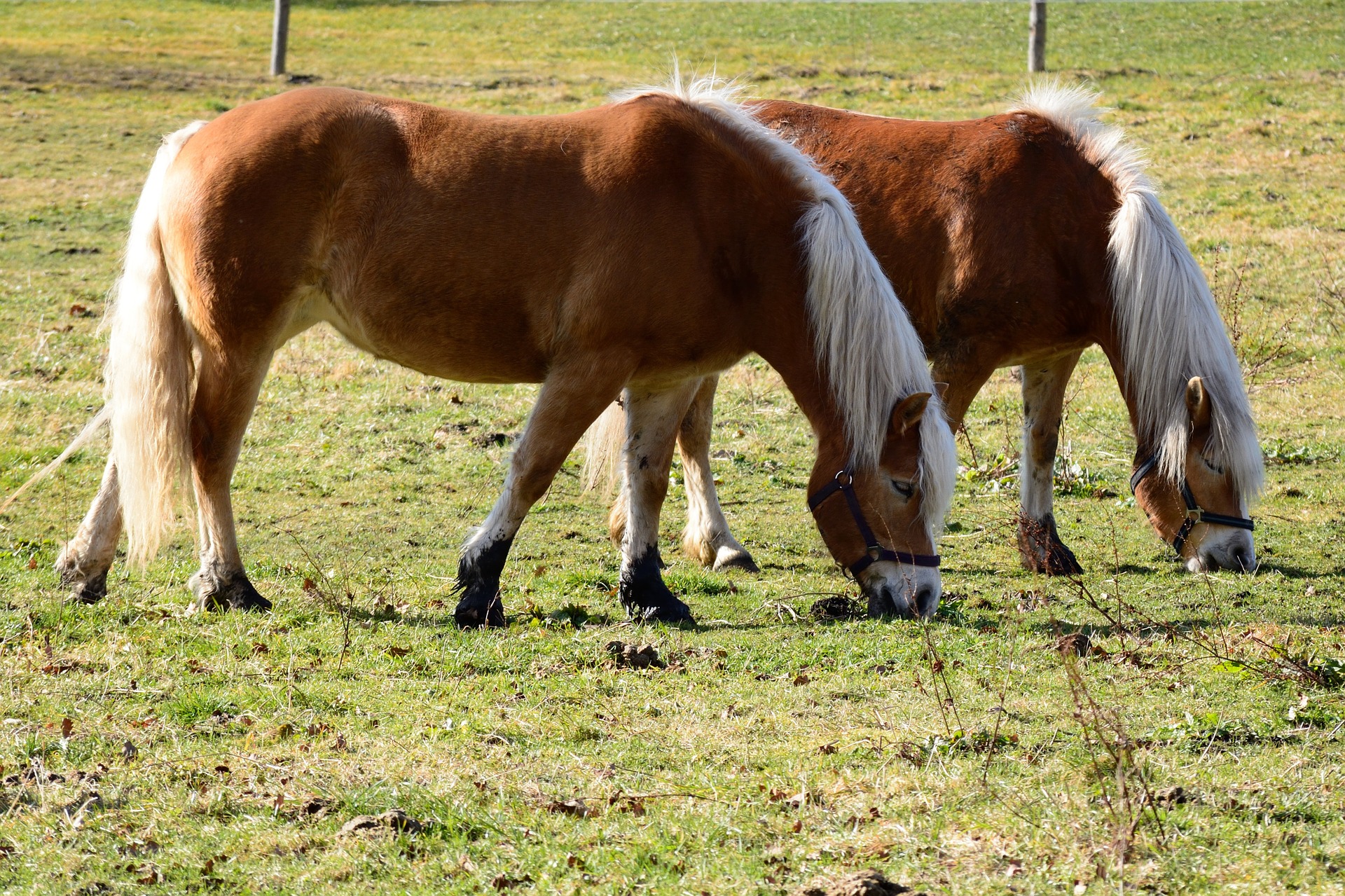
If you know your horse is and will be worked lightly or intermittently, then you have two options. The first is to put your horse on a mild supplement. The second is to elect not to put your horse on anything.
Let me say, I know there is a lot of hype about oral supplements right now. I do agree that if your horse needs them, then they are definitely better than injections, regulated drugs or other more extreme measures.
Sometimes the best supplement is no supplement…
But, I also think that if your horse isn’t going to be ridden too much, and will have lots of leisurely pasture time and rest, then what’s the point? You are paying more for no reason. Horses have naturally done just fine for a long time without supplements!
But it really depends on your horse!
If your horse is predisposed to arthritic issues, is showing signs of arthritis, or your vet is concerned, then it’s a different story. Or even if you really think that you’d rather be safe than sorry, then I would recommend:
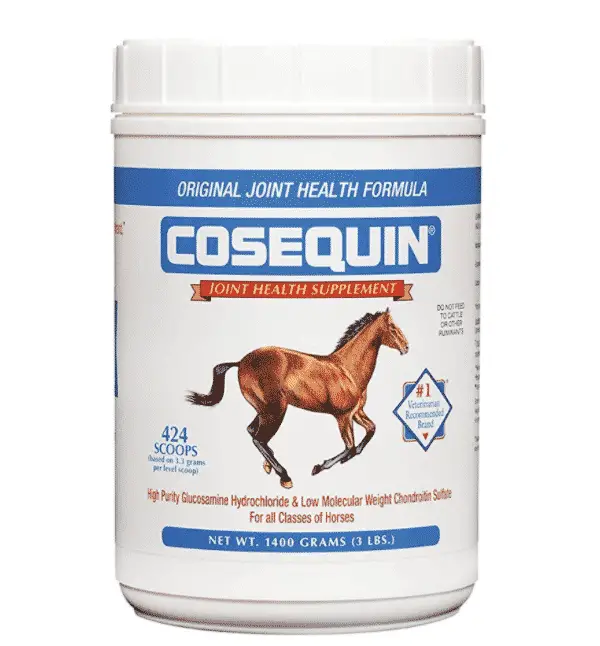
It contains the magic combo of glucosamine and chondroitin you need as well as manganese. I’m not a huge fan of the manganese, but it’s a small amount and the studies say it works, which is what matters. I like this brand because the company is super transparent and they display their research on their site.
The product is scientifically proved to work. And it is also recommended by the majority of vets. These are both good and bad things. It means that its definitely safe and it has been shown to work but there is a good chance that it won’t work for a horse that has more severe issues because it’s safe rather than strong.
If your horse doesn’t need extra manganese
Basically, the Nutramax Cosequin Original is a mild formulation, which is what you’re looking for if your horse isn’t doing too much. The only issue you may have with this one is if your horse is already consuming too much manganese. In this case, go with this product, the Cox Vet Lab Acti-Flex 4000, instead:
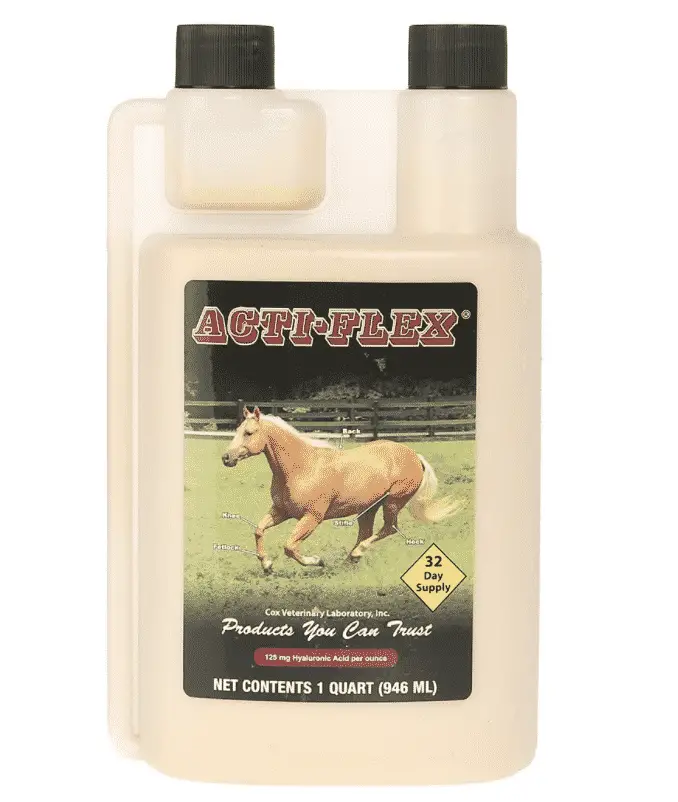
The reason I list Cosequin above Acti-flex is simply because Acti-flex doesn’t include concrete research. That said, it does include a relatively informative label. It works well for a lot of horses, it’s just slightly more “sketchy.” Also I do like Acti-flex because I truly believe in the power of Collagen II (see below for more on damage repair).
Acti-flex 4000 also contains the winning combination of glucosamine and chondroitin. Additionally, it has MSM and herbs for control of heat and pain. It’s definitely more powerful than Cosequin and also has a satisfaction guarantee on it but it’s just not backed with cold hard science.
For moderately worked horses
If your horse is moderately worked, especially in a very repetitive manner, then chances that are over time issues may pop up. Cartilage damage is cumulative and once it passes a certain threshold, it can get very bad very quickly. So the key is to never let it pass that threshold.
Go for the heavier supplement
The way to do this is to supplement early to prevent repetitive stresses from having a slowly destructive effect. I would again recommend Nutramax’s Cosequin but you want the one optimized with MSM:
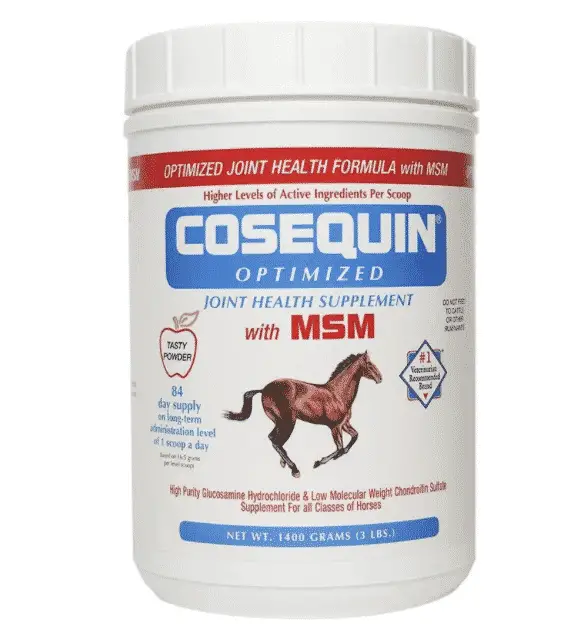
This formulation has higher dosages plus Methylsulfonylmethane (MSM). MSM relieves pain and arthritic symptoms such as swelling and heat. Again, if you are worried about the manganese or simply want an alternative then try Acti-flex.
Furthermore, I would also include a preventative for your horse. Especially if there is a chance of your horse getting worked harder in the future. Refer to the preventative section below for my recommendation.
For heavily worked horses
If your horse is being heavily worked then you want to go with heavier duty supplements. You need to help your horse’s body keep up with the rate of degradation that goes along with high intensity, repetitive and high impact activities.

Even if you don’t like the ones that I suggest, I would strongly recommend putting your horse on something if you would list him or her in this category. You can always – and you should always – talk to your vet for guidance.
Find a supplement that works ASAP
It is almost inevitable, as with high performance human athletes, that horses who are very active will eventually develop joint issues unless they receive treatment. And as with anything else, but especially with joint issues, preventative care is always best.
The best for these horses is:

Or the heavier duty version if your horse doesn’t respond:
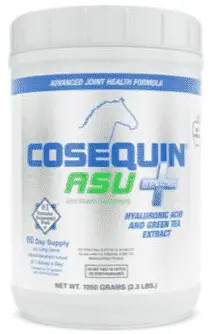
I prefer the Cosequin ASU Plus because it doesn’t include manganese, which is present in quite a large quantity in the Cosequin ASU. Unless you know that your horse needs that much for some reason, I would stick to the Plus.
To manganese or not to manganese
If you do want the manganese, then the Cosequin ASU contains everything in the Cosequin MSM as well as ASU and ascorbic acid. The ASU is good because it acts cumulatively as a preventative.
If you don’t want the manganese then the Cosequin ASU Plus contains everything in the Cosequin MSM plus ASU and catechin from green tea extract. The ASU acts as a potent chondroprotective (protectant of cartilage) in order to prevent future damage. The catechin is an antioxidant which has anti-inflammatory and thus chondroprotective properties.
The only thing I would consider adding to Cosequin in this case is an independent collagen supplement, especially if you think that your horse may already have some damage. And definitely get some if your horse isn’t responding to the Cosequin (see non responsive & damage control sections below).
For preventative measures
If you are only working your horse lightly or moderately now but you think you are going to be working your horse harder in the future, it’s better to invest in a preventative supplement sooner rather than later. Especially if your horse is already moderately to very active.
Act soon and prevent damage before it happens
Joint breakdown occurs little by little overtime. The body tries to cope with the damage by continuously repairing it. But at a certain point it won’t be able to keep up, if the rate of degradation exceeds the rate of repair. Once the damage surpasses a certain threshold, the body can no longer fix it no matter the rest time.
With supplements, you are preventing the rate of degradation from exceeding the rate of repair. You do this by helping the body to repair damage to a greater extent than it would be able to do naturally. So then when your horse starts getting worked harder in the future, you know he or she is going into it with healthy joints without any existing degradation.
Add an ASU that’s chondroprotective

When it comes down to the biology, all supplements work in a preventative manner. There are a few that have shown some regenerative capabilities, namely collagen. However, some supplements work specifically as long term preventative measures. These include ASUs.
In order to prevent further issues down the line, you want to first make sure that your horse is not exhibiting any symptoms now. If he or she is, then make sure you find a supplement that works right now. I would also recommend getting your horse to the vet (if you haven’t already) for diagnosis of the issue to make sure it isn’t serious.
Upgrade sooner rather than later
Instead of whatever regular supplement your horse is on, you should upgrade to an ASU supplement. The one I recommend is again the Cosequin ASU or ASU Plus. The reason I don’t recommend this right away with lighter worked horses is that chances are your horse doesn’t need all the extra stuff that’s in those heavier duty supplements at the moment. And they aren’t doing him or her much good but they are sucking money out of the bank.
For horses that don’t respond
If your horse isn’t responding to what I’ve recommended above, you want to switch to something more potent and unfortunately more expensive.
Even if you’re only working your horse lightly or moderately, but you aren’t seeing an improvement, then I would also suggest switching. Your horse may already have existing damage or simply may be prone to cartilage degradation.
Sometimes you just gotta go with what works
You now know that I get very annoyed at companies that aren’t straight forward and that don’t show all their ingredients or any concrete studies. But at the same time, I want to make sure your horse finds relief and if something works, then you need to know about it.
In addition, I would also recommend a collagen supplement (see below).
For damage control
As you may have read, collagen has the best scientific results when administered orally. By this I mean that it may in fact reverse damage rather than simply prevent it like other compounds.
The problem with collagen…
The issue is that there aren’t many Collagen II supplements out there. I’ve found some independent ones used by bodybuilders. And there’s also Acti-Flex, but again there’s no solid research behind it.
Have a look at this veggie-derived collagen if you’re interested:
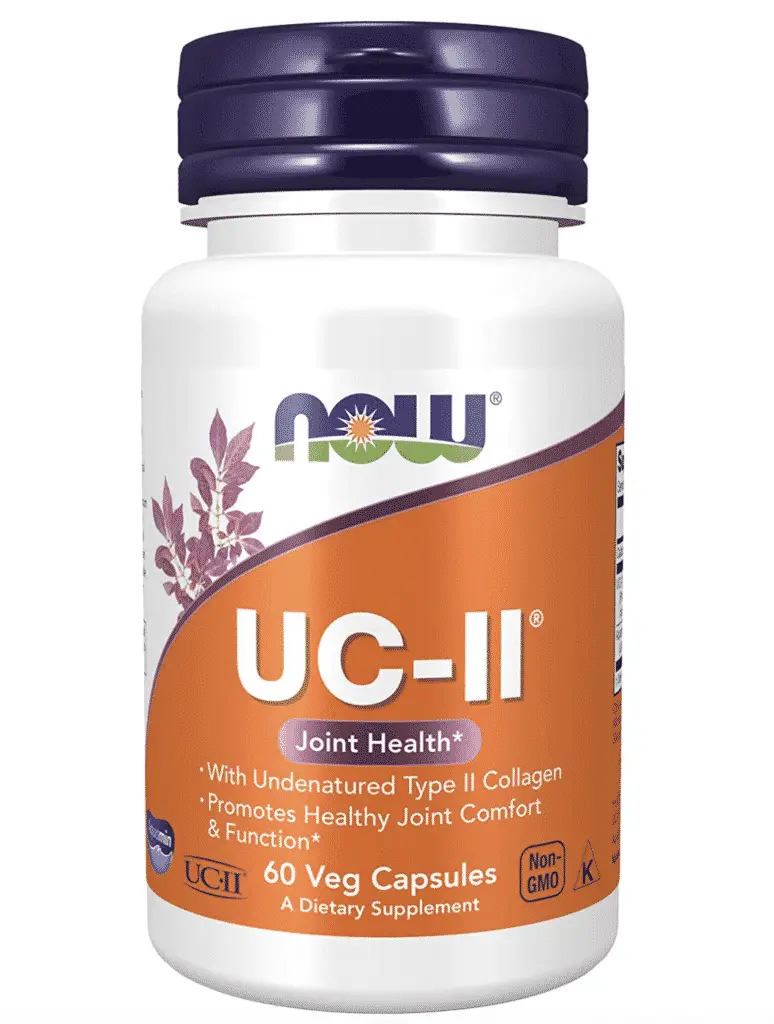
The issue is that the discovery that collagen actually works very well is fairly new and preliminary. So there hasn’t been time and as much of an overwhelming incentive to produce formulations with collagen like there has with the other compounds such as glucosamine and chondroitin.
I will keep digging on collagen and post an update here for you guys if I find anything more reputable!
For severe cases
Sometimes supplements just aren’t enough. If your horse’s damage is too severe, likely there won’t be that much – if any – effect produced. In this case, before you jump to injections, consider Equioxx. It is a NSAID (non-steroidal anti-inflammatory drug) that works very well for virtually all equine joint disorders.
NSAIDs work by blocking prostaglandin production. Prostaglandins are the chemicals that cause inflammation resulting from cartilage degradation. The issue is that in arthritis, inflammation leads to further cartilage degradation. It’s like a vicious cycle. So by blocking the cycle, NSAIDs are able to stop the advancement of the disease.
NSAIDs can cause some bleeding though so so definitely talk to your vet about it if you think it might be a good option for your horse.
I really hope this post was helpful for you guys. Let me know if there are any more questions or comments below! I’d also love to hear about the results that you got if you decided to try any of the products.
Other Posts on Horse Supplements You Might Like…
- Should You Care About Horse Supplements?
- Types of Horse Supplements and What They Do
- How to Choose the Best Horse Joint Supplement
- Vitamin E For Horses: The 3 Reasons You’re Going To Need It!
- Vitamin E for Horses: Why Health-E Is My Favourite Brand
- The Best Horse Supplements | Our Gallery
Happy riding 🙂
Like this post? Share it on Pinterest. Follow Me on Pinterest.
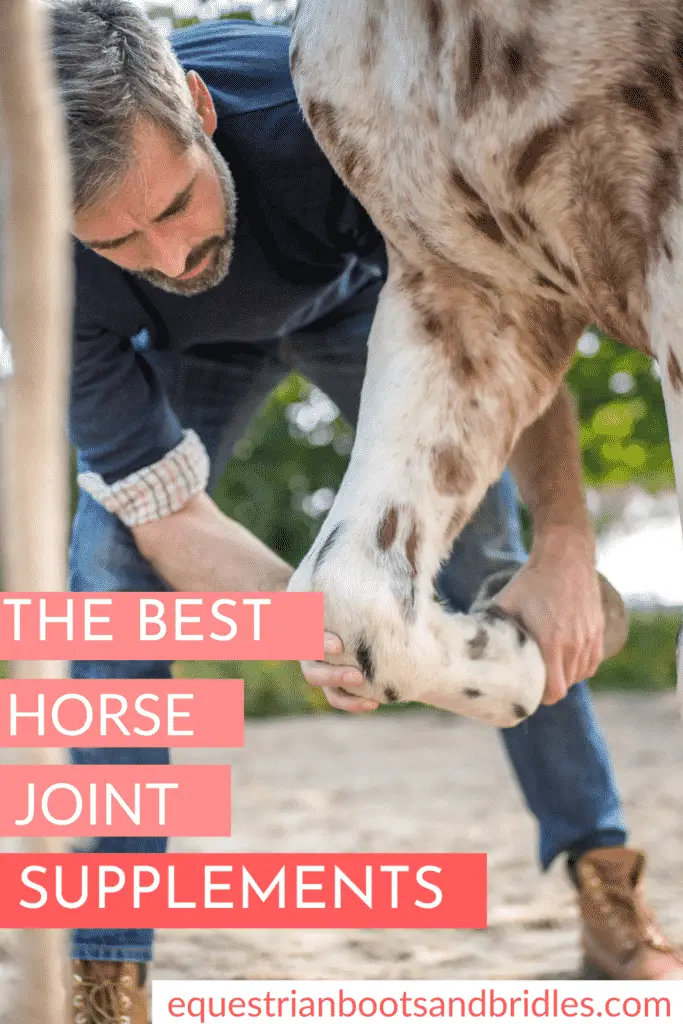
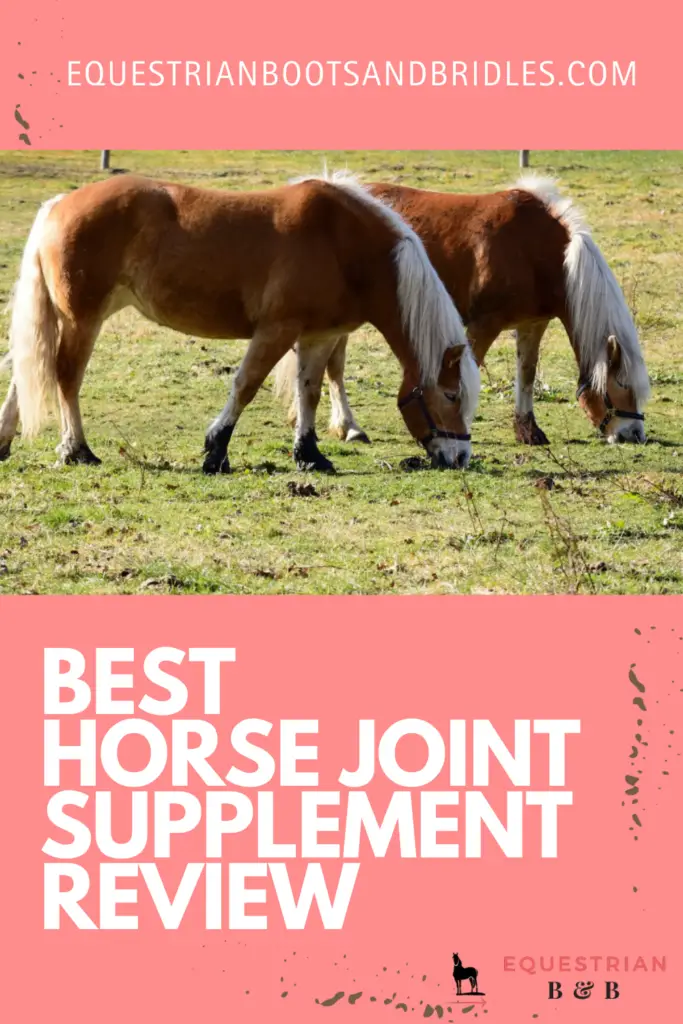


Wow, I have NEVER heard of horse joint supplements, so you learn something new everyday! Are these supplements herbal or do they contain chemicals? Also, how many horses do you own? I am interested in this topic now that I have come across it as there is a lot of controversy around supplements and whether they work
It depends which ones you get – some are herbal based and some are based on natural compounds. These can be extracted from natural sources or manufactured chemically. For a list of the different compounds I put up in a chart, which includes examples of the herbal supplements you can check out my last post here!
At the moment, I don’t own any horses as I’m stuck in the city full time and I just don’t have the time to even board…I know – it’s terrible! But I’m working on it and hope to get back out in the country in the next few years.
Hello,
I’m not very interested in equestrian, but I just accidentally find your blog, and I really like it! I don’t know too many things about horses, so it’s really interesting for me to read.
I totally agree that it can be really hard to find good supplements these days. There are a lot of scammers who are trying to fool gullible people. That’s why before I buy something, I always do my own research on the internet. Blogs like this one can really be helpful for cautious people.
Keep it up!
Hey Julius,
Thank you for your positive feedback 🙂 I’m happy you enjoyed my post and that you learned something new. Maybe someday you’ll change your mind about horses! You might be surprised – cheers,
Martina
Well, because I don’t currently own a horse, although I’d LOVE to, and I never have. And I know nothing about horse supplements, this page was difficult to get through. I am a huge advocate of vitamins and supplements for humans, so I do believe in them. However, I decided to move to another of your pages called the “5 benefits of Horseback Riding” instead. Now THAT was a great read! I love exercise, and I would love to ride a horse as a form of to things = Exercise and my LOVE of animals all in one. Maybe one day if I ever make an income again. TY!
Hey there,
Yes horse supplements can be overwhelming – even for horse owners. Just like human supplements, there’s a lot of options to choose from, a lot of different brands and a lot of different resources so it’s 100% overwhelming.
I’m happy you liked our article on riding benefits. And I’m sorry about your income right now – best of luck on that so that you can start riding!
Let me know if you have any other questions or comments
Cheers,
Martina
Some horse owners take for granted the real athleticism required of their horse, even if just for a daily ride. And that they have a physical body that wears down just as ours do. Knowing to give supplements to an animal and what kind to give is so important. Thanks for the recommendation.
Hey Jaime,
Agreed! And happy to help 🙂
Do you recommend consulting with a vet before starting any kind of supplement program?
We are on a tight budget, and can’t afford much more than boarding and general care for our horse. If we had to choose one supplement, that doesn’t require a vet visit/physical, what would you recommend?
Our horse is about 12 years old generally in very good health.
Thanks for all your great posts. You have lots of useful information!
I would recommend consulting with a vet if you’re looking for a supplement program in order to keep a very athletic horse at peak standards or if you’re trying to treat a condition using supplements because you always want to rule out anything more sinister that requires professional treatment.
Supplements just used to get coats a little shinier or in an effort to keep older joints moving well don’t necessarily need a vet consult but do mention it at your next usual vet appointment that you have started to use them. If your horse is in very good health, then I would recommend no supplement – keep doing what you’re doing 🙂
If you are specifically looking for a preventative joint supplement, I would go with Nutramax as it sounds like your horse is very lightly worked
Cheers,
Martina
Great post – I would stand to reason that there are supplements for animals including horses. I was wondering that if you had a horse that was getting old, would you increase the number of supplements for joint problems. would also be advisable to consult the vet if your horse had joint problems?
Hey Richard
Your horse should be getting regular visits from the vet, who should also be up to date on any joint issues. Increasing supplement dosing simply because of age is definitely not advisable. You want to keep track of how hot and swollen the joints are and also how much activity your horse is doing. Then based on that, and the guide above, you can make a more informed choice. Just like human supplements, you don’t need to discuss each decision with your vet but it’s good to bring up which supplements your using at your routine checkups and then the vet can let you know if they’d make any suggestions/changes 🙂
Great article, informative, and inclusive. I’ve had my horse on plantinum performance complete joint for 6 months. His coat is amazing. He loves eating the mix but he still stocking up and has fluid build up near his joints. He is 10 and we do a lot of hill work and conditioning out on trails other days we will concentrate on arena work for his mind and crossovers. I’m trying to avoid injections and my vet knows he is on platinum she said it’s good stuff. After reading your article I can’t help but wonder if there is something better geared to his joint fluid getting what it needs to be more viscous. Or? I kinda stress daily of this I will openly admit. Looking forward to your reply. Thank you in advance,
Hey Cris,
The fluid build up sounds like chronic inflammation – it would be good if you could bring that down with an NSAID just because if it’s been going on for a while you really wanna try to get that under control. You have to be a little bit careful because too much can cause bleeding but maybe talk to your vet about something like Equioxx. Normally I would say look for products with MSM such as Nutramax Cosequin Equine Optimized with MSM but platinum performance actually has more MSM in it (8200mg I think) compared to the Cosequin (5000mg) per serving size. So I would probably go for the NSAID at this point, which can be but doesn’t need to be injected – it also comes as a tablet.
Hope this helps Cris!
Cheers,
Martina
Hello,
This is a very useful post, and I agree, there are so many supplements out there on the market, you don’t know which one to buy, and some don’t even tell you what’s in them … but atfter reading your article, I now understand why companies don’t always reveal the formula of some supplements. Nevertheless, I always prefer to read the ingredients.
I used to ride when I was a teenager, and I haven’t ridden horses in decades, but there are many horses where I live. They belong to ranchers and they let them roam around. It’s a rural area, so there are lots of open spaces. Some of the hroses though don’t look good, they are thin, and a few are hobbled (it breaks my heart to see that) I tried to talk to the owners about the hobbling, but it’s a little delicate … I can’t get them to get mad at me either … (I live in a small rural area in Mexico).
I didn’t know that these supplements were available for horses, but it makes perfect sense, doesn’t it? Especially for the heavily worked horses. I could tryto talk to the farmers about the supplements, but I’m not sure if I would be successful. But you never know 😉
I think the idea of saving money,for horses that are not too heavily worked,or very lightly worked, by not giving them any supplements, is an excellent piece of advice,especially if it spends more time in the paddock,than being ridden.
As insurance for moderately worked horses,I would agree with the recommended Nutramax with MSM,to prevent pain and arthritic symptoms,manganese could be a problem,so I might go with the Actiflex as an alternative. As a supplement,I would choose Asu Plus,if the horse started to show any symptoms,of overwork or pain.
If the horse is used for jumping,or steeplechasing, or other heavy work,I would be inclined to put them on Cosequin, or the Plus,and in case there was already some damage, a collagen supplement.as we would not like them, to develop joint problems,but provide adequate preventative solutions.
As the supplement companies, as has been pointed out, have clouded the issues, of what to buy for various reasons of self interest,we are very grateful for the guidance given.